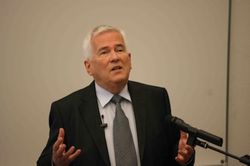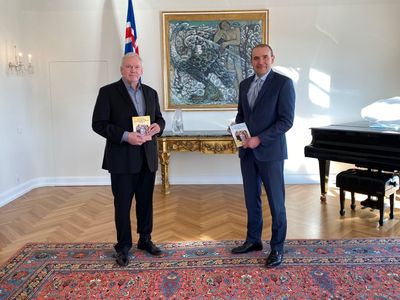28.4.2021 | 09:51
Þorgerður Katrín hneykslast á hagsmunagæslu
Þorgerður Katrín sóttist eftir að verða framkvæmdastjóri SFS. Þar hefði hún auðvitað stutt kvótakerfið og verið andvíg aðild að ESB. Daginn sem hún fékk að vita, að annar yrði ráðinn, gekk hún til liðs við stjórnmálaflokk, sem berst gegn kvótakerfinu og vill aðild að ESB. Hún var þennan dag eins fljót að snúast og 30. september 2008, þegar hún um morguninn mótmælti eindregið á ríkisstjórnarfundi boðskap Davíðs Oddssonar seðlabankastjóra um, að bankarnir væru að hrynja, en seinna um daginn seldi það, sem hún átti eftir af hlutabréfum í bönkum fyrir 70 milljónir kr. (eins og kom nánast fyrir tilviljun fram í hæstaréttardómi nr. 593/2013).
24.4.2021 | 10:37
Vændi og klám í stjórnmálaheimspeki
Á meðan ég kenndi stjórnmálaheimspeki í Háskóla Íslands, reyndi ég eftir megni að hugsa upp rök með og á móti ólíkum sjónarmiðum, reyna á þanþol hugmynda, rekja þær út í hörgul. Heimspekin á að vera frjó samræða, ekki einræða. Eitt sígilt umræðuefni var, hversu langt ríkið mætti ganga í að lögbjóða það, sem er á hverjum tíma talið gott siðferði. Ætti löstur að teljast glæpur? Eins og ég hafði kynnst, þegar ég nam stjórnmálaheimspeki í Reykjavík og Oxford, var þá nærtækt að ræða rök með og á móti því að banna með lögum vændi og klám. Það varð að vísu erfiðara með árunum að ræða þau mál, því að öfgafemínistar í röðum nemenda urðu sífellt aðsópsmeiri og vildu ekki hlusta á nein rök með því að leyfa þetta hvort tveggja. Þetta væri niðurlæging og kúgun kvenna, og með því væri málið útrætt. Þegar ég hreyfði því til dæmis, að hugsanlega mætti leyfa vændi af mannúðarástæðum, því að til væru hópar, sem gætu ekki vegna líkamslýta eða offitu útvegað sér rekkjunauta nema með því að greiða fyrir það, var ég sakaður um „fitusmánun“ og fordóma gegn fötluðum.
Kúgunarrök bannkvenna áttu eflaust stundum við áður fyrr, en þau hafa veikst, því að með netinu hafa milligöngumenn og hugsanlegir kúgarar að miklu leyti horfið, ekki síst þegar um klám er að ræða: Nú selja stúlkur beint aðgang áhorfenda sinna að lostugu athæfi, eins og fram hefur komið hér í blaðinu. Ég hafði hins vegar ekki ímyndunarafl til að smíða dæmi eins og það, sem ég rakst á nýlega um niðurlægingarrökin. Nokkrar konur í Toronto í Kanada ráku stofnun, sem yfirvöld töldu vændishús. Þær mótmæltu harðlega og skutu málinu til dómstóla. Þær buðu í fyrirtæki sínu upp á kynlífsleiki, þar sem ekki var um neina beina líkamlega snertingu að ræða, heldur voru þær í hlutverki kvalara eða drottnara, iðulega leðurklæddar, í netsokkabuxum og með svipu í hendi, og greiddu karlarnir, viðskiptavinir þeirra, fyrir að láta niðurlægja sig á ýmsan hátt. Konurnar unnu málið fyrir Hæstarétti Kanada árið 2013, og komust dómararnir að þeirri almennu niðurstöðu, að bann við vændi svipti konur, sem seldu blíðu sína, lagavernd og neyddi þær niður í neðanjarðarhagkerfið. Þegar ég las um þetta dómsmál, velti ég því fyrir mér, hvernig kalla mætti það niðurlægingu kvenna, að þær fengju sérstaklega greitt fyrir að niðurlægja karla. En eflaust myndu öfgafemínistar reyna að banna umræður um þá spurningu í stað þess að svara henni.
[Fróðleiksmoli í Morgunblaðinu 24. apríl 2021.)
17.4.2021 | 09:38
Þráinn Eggertsson
 Einn virtasti fræðimaður Íslendinga á alþjóðavettvangi, dr. Þráinn Eggertsson prófessor, er áttræður á þessu ári. Tvær bækur hans á ensku um stofnanahagfræði eru lesnar og ræddar í háskólum um allan heim. Ekki er síður um það vert, að Þráinn hefur í nokkrum snjöllum ritgerðum varpað ljósi hagfræðinnar á sögu Íslands. Ein þeirra er um ítöluna og birtist í International Review of Law and Economics árið 1992. Þar minnir Þráinn á samnýtingarbölið (tragedy of the commons). Ef margir nýta saman einhverja auðlind, þá er hætt við því, að hún verði ofnýtt, því að ávinningur af viðbótarnýtingu rennur óskiptur til nýtandans, en kostnaðurinn dreifist á alla. Eitt dæmi um þetta er beitarland í íslenskum afréttum að fornu. Hver sveit nýtti saman slíkt beitarland, en þá gátu einstakir bændur freistast til að reka of margt fé frá sér á fjall. Hrepparnir íslensku mynduðust ekki síst til að hafa stjórn á beitinni. Hver jörð fékk ítölu, eins konar kvóta, tölu þess fjár, sem reka mátti frá henni á fjall, og var heildartalan í hverri afrétt miðuð við, að eftir sumarið sneri féð aftur í eins góðum holdum og kostur væri frekast á. Hliðstæðan við núverandi kvótakerfi í sjávarútvegi leynir sér ekki, enda er vandinn sama eðlis.
Einn virtasti fræðimaður Íslendinga á alþjóðavettvangi, dr. Þráinn Eggertsson prófessor, er áttræður á þessu ári. Tvær bækur hans á ensku um stofnanahagfræði eru lesnar og ræddar í háskólum um allan heim. Ekki er síður um það vert, að Þráinn hefur í nokkrum snjöllum ritgerðum varpað ljósi hagfræðinnar á sögu Íslands. Ein þeirra er um ítöluna og birtist í International Review of Law and Economics árið 1992. Þar minnir Þráinn á samnýtingarbölið (tragedy of the commons). Ef margir nýta saman einhverja auðlind, þá er hætt við því, að hún verði ofnýtt, því að ávinningur af viðbótarnýtingu rennur óskiptur til nýtandans, en kostnaðurinn dreifist á alla. Eitt dæmi um þetta er beitarland í íslenskum afréttum að fornu. Hver sveit nýtti saman slíkt beitarland, en þá gátu einstakir bændur freistast til að reka of margt fé frá sér á fjall. Hrepparnir íslensku mynduðust ekki síst til að hafa stjórn á beitinni. Hver jörð fékk ítölu, eins konar kvóta, tölu þess fjár, sem reka mátti frá henni á fjall, og var heildartalan í hverri afrétt miðuð við, að eftir sumarið sneri féð aftur í eins góðum holdum og kostur væri frekast á. Hliðstæðan við núverandi kvótakerfi í sjávarútvegi leynir sér ekki, enda er vandinn sama eðlis.Önnur ritgerð Þráins birtist í Journal of Economic Behavior and Organization árið 1996. Hún er um þá ráðgátu, hvers vegna Íslendingar sultu öldum saman heilu og hálfu hungri, þótt hér væri gnótt fiskjar. Þráinn telur skýringuna vera, að konungur og fámenn stórbændastétt hafi í sameiningu þrengt að sjávarútvegi, sem var að öðru óbreyttu arðbærasti atvinnuvegurinn. Konungur óttaðist, að ella gengi landið undan honum, eins og lá við að gerðist á „ensku öldinni“ svokölluðu, fimmtándu öld. Hann kaus frekar litlar skatttekjur en engar. Stórbændurnir vildu hins vegar ekki missa vinnuaflið að sjávarsíðunni. Útlendingum var því bönnuð veturseta, og landsmenn urðu að vera vistaðir á einhverju hinna fimm þúsund býla landsins og gátu aðeins stundað fiskveiðar í hjáverkum. Með konunglegum tilskipunum var verð á fiski fært langt niður frá markaðsverði, en verð á landbúnaðarafurðum að sama skapi fært upp. Afleiðingin var, að Ísland festist í fátæktargildru, sem það losnaði ekki úr, fyrr en yfirvöld í Kaupmannahöfn höfðu skilið kenningu hagfræðinnar um kosti alþjóðlegrar verkaskiptingar og viðskipta. Þráinn Eggertsson er einn fremsti fulltrúi þeirrar rannsóknarhefðar á Íslandi.
16.4.2021 | 17:46
Leiðréttingarnar sem voxeu neitaði að birta
Foreword
Iceland is a tiny, remote island of which others know little. The Danish kings who ruled the country from 1380 to 1918 tried at least five times to sell her to others, thrice to the King of England, once to the merchants of Hamburg and once to Prussia. Unsurprisingly, then, Iceland has been an ideal target of fantasists, fabulists and mythmakers, the most notorious one being Dithmar Blefken, an itinerant preacher in Germany whose 1607 book on Iceland prompted a distinguished scholar, Arngrim Jonsson the Learned, to write a spirited defence of his motherland. The accounts by Blefken and other vilifiers of Iceland were however believed by some. Jean-Jacques Rousseau wrote for example (in Note P to the Second Part of his Discourse on Inequality) that some of the noble savages from Iceland brought to Denmark to be educated withered away and died, whereas others drowned when they tried to swim back to their country. Friedrich Engels, in a letter to Karl Marx from December 1846, spoke with disdain about the ‘greasy’ Icelanders who drank fish-oil, lived in earthen huts and broke down if the atmosphere did not reek of rotten fish. Now we have got a modern counterpart to old Blefken, and an Icelander to boot: Thorvaldur Gylfason, Professor of Economics at the University of Iceland, whose fifteen minutes of fame consisted in being elected in 2010 to a Constitutional Assembly which the left-wing government of 2009–2013 set up. Because of irregularities in the conduct of the elections to the Assembly, the Icelandic Supreme Court invalidated the elections. Nevertheless, Gylfason was appointed by the leftwingers in government to what was then called the ‘Constitutional Council’. This unelected group wrote a draft of a new constitution for Iceland that was seen as being so flawed that even the left-wing government refrained from accepting it. (In a 2012 referendum on the draft, only 49 per cent of the voters bothered to turn up, with two thirds of them accepting the draft as a proper guideline for a new constitution, which means that it was backed by only one third of those with a right to vote) In anger, Gylfason founded a political party whose sole purpose was to get the draft from the Constitutional Council accepted. This party received less than 2.5 per cent of the votes cast in the 2013 parliamentary elections and seems after that to have vanished into thin air. Gylfason has however written widely abroad about the ever-increasing corruption in Iceland of which, he claims, the rejection of the draft from the Constitutional Council is the clearest example. In a recent article in the online journal voxeu, Gylfason made some extraordinary claims, some being plainly wrong and slanderous, others being the half-truths that Tennyson called the blackest of lies. I sent some corrections to the Editor of voxeu, Professor Richard Baldwin, but he refused to publish them. Below are the corrections which I sent under the title ‘Iceland is Not a Failed State’. In a separate piece I shall publish the extraordinary correspondence with the voxeu Editor.
The comments on Iceland in a recent article in Voxeu by Professor Thorvaldur Gylfason (2021) have surprised many Icelanders. These comments certainly stand in need of some corrections and clarifications. I shall try to be as brief as possible and confine myself to matters of fact.
Gylfason says: ‘Iceland is a country that some observers have begun to view as a failed state.’ On the contrary, Iceland does well on almost any criteria for success. She is and has long been, with Luxembourg, Norway, and Switzerland, one of the most prosperous countries in Europe, in terms of GDP per capita. The infant mortality rate is, according to the UN, the lowest in the world (United Nations, 2019). The crime rate (the number of reported crimes divided by the total population) is lower than in the other Nordic countries and one of the lowest in the world (World Population Review, 2021). The rapid recovery of Iceland after the 2008 bank collapse has been widely noted. Moreover, Iceland is a well-functioning democracy. Civil rights are relatively well protected there. In short, Iceland is a typical Nordic country, prosperous and peaceful, and far from being a failed state in the sense of Acemoglu and Robinson (2012).
The Quota System in the Fisheries
Nonetheless, Gylfason writes: ‘Iceland has a serious problem with its Russia-style oligarchs. These are usually owners of fishing vessels, whom the political class has enriched by awarding them free (or virtually free) access to Iceland´s valuable fish resources. In exchange for cash, the politicians have created a fish-based ruling class that behaves like a state within the state, dictating policy platforms to political parties, court verdicts, newspaper editorials, some academic appointments, and more.’
This is highly misleading. Income distribution is more equal in Iceland than in almost any other European country. According to Eurostat (2021), the risk-at-poverty rate (the proportion of people with income below 60 per cent of median income) is lower in Iceland than in any other European country, and therefore probably in the whole world. The latest available figure for Iceland is 8.8 per cent, whereas for Finland it is 12.0, for Denmark 12.7, for Norway 12.9, and for Sweden 16.4. Another set of numbers might be relevant in a discussion about oligarchy. According to the World Bank (2021), the latest figure for the proportion of income enjoyed by the top 10 per cent of the population was 22.5 per cent in Iceland. Corresponding figures for the other Nordic countries were for Denmark 24.0, Finland 22.6, Norway 21.6, and Sweden 22.3. In other words, the economic position of the most affluent group in Iceland was no stronger than in the other Nordic countries.
Gylfason’s assertion, that ‘in exchange for cash, the politicians have created a fish-based ruling class’, is almost beyond belief. It involves, apparently, a serious allegation against Icelandic politicians: that they were bribed to give quotas to owners of fishing vessels. The truth of the matter is quite different.
Catch quotas, or shares in the total allowable catch in each fish stock, were first introduced in the two pelagic fisheries in response to their possible collapse: in the herring fishery in 1975 and in the capelin fishery in 1980. Since most of the vessels in these fisheries were of similar size, initial allocation was non-controversial. The boats simply received equal quotas. Soon it was found that flexibility required the possibility for transfers of quotas between vessels. This was seen to be successful and this nascent system of transferable catch quotas eventually became the model for the economically much more important demersal fisheries which were also threatened by collapse. In 1984 catch quotas were introduced in the demersal fisheries, for cod, catfish, haddock, halibut and other groundfish. Initial allocation was made on the basis of catch history over the three years preceding the introduction of the system (the ‘grandfathering’ principle). In 1990, a law was passed by which the quota system was made comprehensive, and the quotas were made almost fully transferable; they were allocated without any time limits. Since then, almost all the quotas initially allocated have been transferred between fishing firms. The more efficient owners of fishing capital have bought out the less efficient ones and total fishing effort has gone down to what approaches the optimum. Today, the Icelandic fisheries are both profitable and sustainable, unlike fisheries in most other countries (Gissurarson, 2015).
In other words, the quotas are not, and have never been, allocated on political grounds, in a discretionary way. Initially, some 45 years ago in the herring fishery and some 37 years ago in the demersal fisheries, they were allocated on the basis of catch history (according to the ‘grandfathering’ principle), and since then they have been allocated spontaneously in the market for quotas, by transfers between fishing firms. The assertion that ‘in exchange for cash, the politicians have created a fish-based ruling class’ is completely baseless. It is a different issue altogether that the economic success of the system has ignited disagreement on the legal status of the now very valuable catch quotas (whereas under open access to fishing grounds the right of all to harvest fish at sea becomes virtually worthless as a result of excessive fishing effort, as H. S. Gordon (1955) demonstrated).
The Revision of the Icelandic Constitution
Gylfason goes on to say that ‘this alliance of politicians and oligarchs has persisted in unapologetically disregarding the result of a 2012 national referendum, where 67% of the voters declared their support for a new post-crash constitution drawn up by a constitutional assembly elected by the nation in 2010’.
This is also highly misleading. When Iceland in 1944 repealed the Act of the Union with Denmark, in force since 1918, a referendum was held on the new Constitution for the Republic which was in most important aspects based on the Constitution given to Iceland by the Danish government in 1874. The results were impressive. Of those eligible to vote, 98.4 per cent used their right. Of those who voted, 95.0 per cent voted for the new Constitution (Statistics Iceland, 1988). After the 2008 bank collapse some felt that a new constitution was needed, although others failed to see the logic behind this. Be that as it may, the left-wing government taking power in 2009 held elections to a 25-strong constitutional assembly in 2010. The turnout was very low, only 36.7 per cent. Subsequently, some irregularities in the conduct of the elections led the Icelandic Supreme Court to invalidate the elections. Then the government simply appointed the 25 delegates who had received the most votes in the now-invalidated ‘elections’ to a ‘Constitutional Council’. This Council delivered its proposals for constitutional changes in 2012. In a referendum on the suggestions, the turnout was again quite low, 48.9 per cent. Of those who voted, 66.1 per cent wanted the proposals of the Constitution Council to form the basis of a new draft Constitution, and 33.1 voted against it (Statistics Iceland 2021).
In other words, there was no constitutional assembly legally elected by the nation in 2010, and only one-third of Icelanders with the right to vote declared their support for the proposals of the Council appointed by government of which, incidentally, Gylfason was a vocal member. Compare this to the 98.4 per cent turnout in the 1944 referendum and the 95.0 per cent support then for the Constitution. Consequently, the left-wing government (which can hardly be said to be an ‘alliance of politicians and oligarchs’) decided not to act on the Council’s proposals. In protest, Gylfason founded a party which ran in the 2013 parliamentary elections on a single issue, the demand for constitutional changes in accordance with the proposals of the Constitutional Council. The party received 2.5 per cent of the votes cast and no parliamentary seat.
In passing, Gylfason mentions a case of alleged bribery by an Icelandic fishing firm being investigated in Namibia. It should be emphasised that this case is still unresolved. But even if the courts would eventually conclude that bribes had been given, certainly Iceland as a society should no more be judged by that than for example Sweden by the bribery scandals at arms manufacturers Brofors and Saab. Here I shall not go either into Gylfason’s allegation that a ‘fish-based ruling class’ in Iceland is ‘dictating policy platforms to political parties, court verdicts, newspaper editorials, some academic appointments, and more’ except to say that it would be interesting to see the evidence for this sweeping indictment of Icelandic judges, journalists and academics.
Party Patronage in Iceland
Gylfason writes: ‘Iceland’s civil service and court system are stacked with political appointees who, as members, take their cue from the political class. Large swaths of the business community fit the same pattern.’ It is certainly true that in Iceland, as in other democratic countries, government ministers make many appointments, although usually they can only choose between candidates that selection committees have considered competent. But there is no reason to believe that such appointments are made in a less professional way than in most other European countries. The latest study of the subject seems to be a comparative survey from 2008 of party patronage in 15 European countries, including Iceland, Denmark and Norway. The conclusion was that party patronage was least common in the UK, the Netherlands, Denmark, Iceland, and Norway, with the Index of Party Patronage going up from 0.09 in the UK to 0.26 in Norway. Party patronage was most common in Greece, Austria, Italy, Germany and Hungary, with the Index going down from 0.62 in Greece to 0.43 in Hungary (Kopecký and Mair, 2012, 367). Certainly, this study does not lend much support to Gylfason’s assertions.
References
Acemoglu, D and J Robinson (2012), Why Nations Fail: The Origins of Power, Prosperity, and Poverty, New York NY: Crown Business.
Eurostat (2021), Income Poverty Statistics, https://ec.europa.eu/eurostat/statistics-explained/index.php?title=Income_poverty_statistics
Gissurarson, H (2015), The Icelandic Fisheries: Sustainable and Profitable, Reykjavik: University of Iceland Press.
Gylfason, T (2021), From truth to reconciliation: Lessons from Iceland, VoxEU.org 6 February 2021. https://voxeu.org/article/truth-reconciliation-lessons-iceland
Gordon, H S (1955), “The Economic Theory of a Common-Property Resource: The Fishery,” Journal of Political Economy, 62 (2), 124–142.
Kopecký, P and P Mair (2012), Conclusion: Party Patronage in Contemporary Europe, Party patronage and party government in European democracies, eds. P Kopecky, P Mair and M Spirova, Oxford: Oxford University Press.
Statistics Iceland (1988), Kosningaskyrslur, Vol. I, Reykjavik: Statistics Iceland.
Statistics Iceland (2021), data on elections, https://statice.is/
United Nations (2019), World Population Prospects, https://population.un.org/wpp/
World Bank (2021), World Development Indicators, http://wdi.worldbank.org/table/1.3
World Population Review (2021), https://worldpopulationreview.com/country-rankings/crime-rate-by-country
(Grein í The Conservative 16. apríl 2021.)
10.4.2021 | 10:55
Rangfærslur í Finnlandi
Finnskur kennari við Háskólann á Akureyri, Lars Lundsten að nafni, skrifaði fyrir skömmu grein í Hufvudstadsbladet í Helsingfors um, að Ísland væri spilltasta landið í hópi Norðurlanda. Ég svaraði í blaðinu 7. apríl og benti á, að heimild hans væri hæpin. Hún væri alþjóðleg spillingarmatsvísitala, en eins og fram hefur komið opinberlega, hefur einkunn Íslands samkvæmt henni aðeins lækkað vegna þess, að tveir íslenskir matsmenn, Grétar Þór Eyþórsson (samkennari Lundstens á Akureyri) og Þorvaldur Gylfason, hafa metið Ísland niður nokkur síðustu ár án sýnilegrar ástæðu.
Ég benti einnig á, að venjuleg merki víðtækrar stjórnmálaspillingar væri ekki að sjá á Íslandi. Hér væri velmegun meiri og almennari en víðast hvar annars staðar og tekjudreifing jafnari, jafnframt því sem Ísland teldist friðsælasta land í heimi og með minnstu glæpatíðni.
Í svari sínu í sama tölublaði gerði Lundsten aðeins eina efnislega athugasemd. Hún var, að ég segði Samherja ranglega hafa verið sýknaðan í sakamáli vegna gjaldeyrisskila. Dómstólar hefðu ekki fellt efnislegan úrskurð í málinu. Lagaheimild hefði skort til þess.
Auðvitað er þessi athugasemd Lundstens fjarstæða. Menn og fyrirtæki verða einmitt ekki sakfelld, nema til þess sé lagaheimild. Í réttarríki ráða lögin, ekki mennirnir. Með dómi Hæstaréttar 8. nóvember 2018 var stjórnvaldssekt, sem Seðlabankinn hafði lagt á Samherja, numin úr gildi. Embætti sérstaks saksóknara hafði áður fellt niður meginþætti málsins gegn fyrirtækinu og látið svo um mælt í bréfi til þess, að það hefði lagt sig fram „af kostgæfni“ að fylgja settum reglum um gjaldeyrisskil, en um það snerist málið. Embætti skattrannsóknarstjóra, sem hafði líka skoðað málið, hafði ekki talið ástæðu til aðgerða. Mér er ekki ljóst, hvað Lundsten gengur til með þessari árás í erlendu blaði á eitt öflugasta útflutningsfyrirtæki landsins.
(Fróðleiksmoli í Morgunblaðinu 10. apríl 2021.)
3.4.2021 | 09:20
Uppljóstrun um fjármál flokka
Liðin eru 409 ár, frá því að Arngrímur lærði birti rit sitt, Anatome Blefkeniana (Verk Blefkens krufin), þar sem hann andmælti alls konar furðusögum um Ísland, sem þýski farandprédikarinn Dithmar Blefken hafði sett saman. Mér sýnist ekki vanþörf á að endurtaka leikinn, því að Þorvaldur Gylfason prófessor hefur farið víða um lönd og prédikað gegn þjóð sinni, sérstaklega útgerðarmönnum. Þorvaldur stofnaði sem kunnugt er stjórnmálaflokk um baráttumál sín, og fékk hann 2,5% í kosningunum 2013 og engan þingmann. Í skýrslu, sem Þorvaldur tók nýlega saman um stjórnarfar á Íslandi fyrir Bertelsmenn stofnunina í Þýskalandi, segir hann, að lög um fjármál stjórnmálaflokka hafi verið sett á Íslandi, eftir að Ríkisendurskoðun hafi ljóstrað upp um, að útgerðarfyrirtæki hafi styrkt Sjálfstæðisflokkinn og Framsóknarflokkinn tífalt á við aðra flokka árin 2008–2011.
Þetta er fjarstæða. Lög um fjármál stjórnmálaflokka voru sett árið 2006, fyrir það tímabil, sem Þorvaldur nefnir. Ég hef hvergi rekist á neina uppljóstrun um, að árin 2008–2011 hafi útgerðarfyrirtæki styrkt Sjálfstæðisflokkinn og Framsóknarflokkinn tífalt á við aðra flokka. Ríkisendurskoðun kannast ekki heldur við málið. Þessi tala gæti að vísu verið nálægt sanni, því að útgerðarfyrirtæki styrkja vissulega frekar þessa flokka en vinstri flokkana. En í lögunum frá 2006 um fjármál flokka eru settar strangar almennar skorður um styrki fyrirtækja til flokka, og kemur meginhluti tekna flokkanna frá ríki og sveitarfélögum.
Ég skoðaði málið á heimasíðu Ríkisendurskoðunar. Árin 2008–2011 fékk Sjálfstæðisflokkurinn 804,8 millj. kr. í framlög, aðallega frá ríkinu, en 15,2 millj. kr. af þessu fé kom frá útgerðarfyrirtækjum, innan við 2% af heildarframlögum. Framsóknarflokkurinn fékk 319,2 millj. kr. samtals, þar af 8,2 millj. kr. frá útgerðarfyrirtækjum, um 2,5% af heildarframlögum. Samfylkingin fékk 620,6 millj. kr. samtals, þar af 2,3 millj. kr. frá útgerðarfyrirtækjum. Vinstri grænir fengu 402,3 millj. kr. samtals, þar af innan við 500 þús. kr. frá útgerðarfyrirtækjum.
Af tekjum stjórnmálaflokkanna kom með öðrum orðum aðeins brot frá útgerðarfyrirtækjum, um 2,5%, þar sem hlutfallið var hæst. Samtals námu framlög útgerðarfyrirtækja til Sjálfstæðisflokks og Framsóknarflokks þetta tímabil 23,4 millj. kr., en til Samfylkingar og Vinstri grænna á sama tímabili 2,7 millj. kr. Samtals voru því framlögin í þessu dæmi rösklega áttföld, ekki tíföld. En sú tala skiptir vitanlega engu máli, því að tekjur Sjálfstæðisflokks og Framsóknarflokks af framlögum útgerðarfyrirtækja voru aðeins örlítið brot af heildartekjum þeirra. Það var lægra hlutfall en Þorvaldur fékk í kosningunum 2013, og var það þó lágt.
(Fróðleiksmoli í Morgunblaðinu 3. apríl 2021.)
1.4.2021 | 12:38
Forseta afhent eintak
Ég skrapp á Bessastaði 30. mars og afhenti forseta Íslands, dr. Guðna Th. Jóhannessyni, eintak af hinni nýútkomnu bók minni, Twenty-Four Conservative-Liberal Thinkers, sem kom út í tveimur bindum hjá New Direction í Brüssel. Bókin er líka til á netinu.










